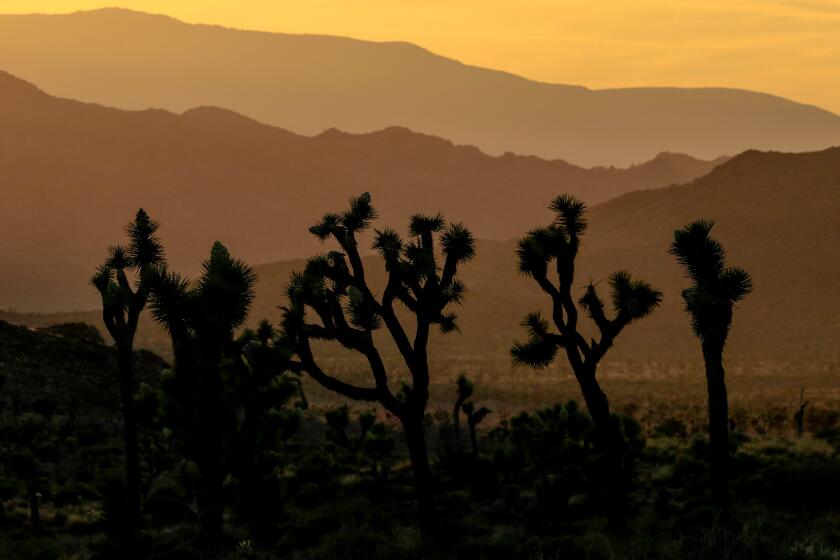The man with his hand on California’s spigot
For more than a decade, the state’s de facto water baron has been a man most Californians never heard of.
Oliver W. Wanger is not the archetypal power broker embodied by William Mulholland but a workaholic U.S. District Court judge whose Fresno courtroom was the forum for many of the state’s fiercest water conflicts.
Last week was his last on the bench. At the age of 70, Wanger returned to private practice, leaving a record of long, complex rulings and a parting diatribe at federal scientists that has echoed across the country.
Wanger’s decisions determined how much water gets pumped from the Sacramento-San Joaquin Delta south to fields and cities and how much stays behind to sustain fish species pushed to the edge of extinction by the state’s thirst. He is known for delving deeply into the minutia, writing opinions that at times read like scientific papers.
“He has been hugely influential,” said Richard Frank, director of the California Environmental Law & Policy Center at UC Davis. “I think he in many ways has been the most important public official when it comes to California water policy in the last 15 years.”
A former Marine Corps sergeant, prosecutor and civil trial lawyer who grew up in Beverly Hills, Wanger was appointed to the bench in 1991 by President George H.W. Bush.
A year later Congress passed the Central Valley Project Improvement Act, altering decades of federal irrigation policy. Farmers who were used to getting plenty of cheap federally subsidized water had to pay more and give up some supplies for the benefit of fish and wildlife. In 1993, the delta smelt was placed on the endangered species list.
The ensuing, and still raging, war between fish protections and water exports sent a seemingly endless stream of lawsuits to Wanger’s courtroom.
In a series of decisions, he handed victories to both sides. He found that the federal and state water-delivery systems imperiled native smelt and salmon. He ruled that fish protections issued by the George W. Bush administration were inadequate. Then he found that tougher pumping restrictions imposed later were not entirely justified.
“I have always been what I would call a down-the-middle person, calling things as I see them,” Wanger, a Republican, said in an interview during his final week. “I feel I don’t have many friends. That is a fact. Every constituency in these cases finds a reason to not like what I do.”
It was neither his retirement nor one of his bulky opinions that recently set the water world buzzing, but his remarks from the bench last month. Ruling on a motion in the latest smelt case, Wanger let loose an uncharacteristic harangue, declaring the testimony of federal biologists Frederick Feyrer and Jennifer Norris so contradictory and inconsistent that it amounted to deliberate deception and “bad faith” on the part of the Interior Department.
“I’ve never seen anything like it,” he said repeatedly, calling Norris, an assistant field supervisor in the U.S. Fish and Wildlife Service’s delta office, a “zealot” who was “incredible as a witness.”
“And I am going to make a very clear and explicit record to support that finding of agency bad faith because, candidly, the only inference that the court can draw is that it is an attempt to mislead and to deceive the Court into accepting what is not only not the best science, it’s not science,” he added.
A transcript of the hearing, circulated by water contractors, became ammunition in the politicized battles over science that have come to characterize environmental disputes.
U.S. Rep. Devin Nunes (R-Tulare) called for oversight hearings, comparing, in a Sept. 21 letter to Interior Secretary Ken Salazar, the agency’s actions to those of “brutal dictators such as Robert Mugabe and Saddam Hussein who used water as a weapon against their own populations.”
The Interior Department said it was standing by its scientists and their findings. In an internal memo, the regional director of the U.S. Fish and Wildlife Service called the biologists “outstanding public servants and scientists.” Their defenders say that what Wanger saw as inconsistency was no more than scientific uncertainty. And they point out that his remarks echoed a brief filed in the case by water contractors.
Kate Poole, attorney for the Natural Resources Defense Council, has appeared before Wanger for seven years, representing environmental and fishing groups in the delta cases. “I think he tries very hard to be impartial, and many of his rulings reflect that,” she said. But when Wanger “discussed the two scientists in personal terms — in my view he lost some of his impartiality there and he let his personal feelings intrude into that decision.”
Wanger said he couldn’t comment directly on the case, which is headed to an appeals court. “Of course, there is never anything personal and never intent to do any kind of harm to anybody.”
“Candidly,” he added, “I think that people who have objectives or motives that aren’t associated with the law are trying to use this either for advantage or disadvantage based on their partisan interest, and the court has nothing to do with that.”
Wanger’s decisions were sometimes several hundred pages long, replete with charts and technical analysis.
“I don’t think any federal judge [in California] has so immersed himself in not just the law but the science and the technical aspects of these exceedingly difficult water and environment cases as Ollie Wanger,” Frank said. “I think in many ways he’s to be commended for that.”
But at times, Poole said, Wanger has gone too far. “We have argued in certain cases … that he has basically made scientific calls when there’s a dispute between scientists that are improper for him to make” under the provisions of the Endangered Species Act. “He shouldn’t be the arbitrator for scientific disputes. Congress has given that role to the expert agencies.”
Judges do have the authority to decide the credibility of expert witnesses, and Wanger says that is what he has done.
“Law and science are converging as our society becomes increasingly technological and as knowledge becomes more available,” said Wanger, who had five law clerks and sometimes consulted independent court-appointed experts. “This means that … courts are to become gatekeepers to differentiate between what is called junk science and reliable science.”
Wanger technically retired five years ago but continued to work as a senior judge 75 to 80 hours a week, “at night, at home, on the weekends and holidays,” drawing a $174,000 pension annuity that he would have collected had he just gone home and sat in his easy chair.
The Eastern District of California in which he presided is the busiest in the federal district court system. Wanger handled 1,200 cases. His departure means the two remaining judges in the Fresno Division will have to pick them up.
“Maybe Congress can find the time to care about the public whose interests are being disserved in these cases that will need to be heard,” Wanger said, taking a swipe at the partisan gridlock that has blocked new judicial appointments.
On Monday, Wanger, who still has a son to put through college, began a new job as a private judge, mediator and occasional trial lawyer. “I’m starting from ground zero. It’s a new career and new challenges.”
More to Read
Sign up for Essential California
The most important California stories and recommendations in your inbox every morning.
You may occasionally receive promotional content from the Los Angeles Times.











